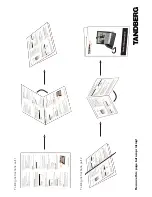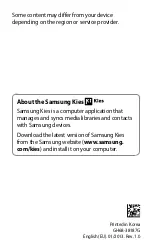
87
Making/Receiving
Video
p
hone Calls
Re
ceiv
in
g a Video
pho
ne Ca
ll
Function menu (videophone ringing screen)
*
:
This service is not supported as of August 2006.
Changing videophone call to voice call (the other party)
Your received videophone call is changed to voice call by changing the call mode on the other party’s
phone.
d
You can change a videophone call only when you are the caller. When you are a callee, you cannot
change the call mode.
d
To change a call on the dialing phone, “Ntfy switch-mode” must be set to “Indication ON” on the receiving
phone beforehand.
→
p.92
1
Videophone in-call screen (p.81)
X
Change the call mode on the
dialing phone
While a videophone call is changed to voice call, the screen is displayed showing that the calls are being
changed, and a voice guidance is played.
Call Rejection
Ends a call without answering it.
Call
Forwarding
Forwards a call.
The call is forwarded regardless of whether the “Call Forwarding” setting is “Activate” or “Deactivate”.
“Call Forwarding Service”
→
p.427
Voice Mail
*
Connects the caller to the Voice Mail service center.
The caller is connected to the service center regardless of whether the “Voice Mail” setting is “Activate” or
“Deactivate”.
“Voice Mail Service”
→
p.424
Change Display
Changes the display from Additional Number 1 or 2 to the number from which the call is forwarded.
This setting is available when Multi Number (Additional Number 1 or 2) and Call Forwarding are activated
for receiving calls.
“Multi Number”
→
p.431
NOTE
e
Digital call charges still apply to a caller when a substitute image appears during a videophone call.
e
Even if “Call Forwarding” is set to “Activate”, a received videophone call can only be forwarded if the forwarding
number is a 3G-324M-compatible (p.80) videophone. Check the forwarding destination phone before setting up call
forwarding.
e
If you receive a videophone call from a caller who is barred in the Nuisance Call Blocking service, the caller sees a
movie announcement that the call has been rejected, and then the call ends.
e
Press
q
or
s
(MEMO/CHECK) during an incoming videophone call, then “Record message” starts and the
message can be recorded. (Pressing
q
sets the manner mode at the same time.)
→
p.77
e
You cannot receive i-mode mail, MessageR or MessageF during a videophone call. Mails you cannot receive are
held at the i-mode Center. Receive them using “Check new messages” after a videophone call ends.
e
You can receive SMS during a videophone call.
e
When you have subscribed to the “Call Waiting”, “Voice Mail” or “Call Forwarding” service and a videophone call
arrives while you are talking on another videophone call, end the call in progress to answer the call that has newly
arrived.
e
If the “Recharge battery” low voltage alarm appears on the display during a videophone call, the other party sees
the “
カメラオフ
Camera Off” message and the call is disconnected roughly 20 seconds later. If you start charging
a battery before a videophone call is terminated, the call continues with the image that had been displayed before
the low voltage alarm was given.
e
A FOMA terminal does not ring and the incoming call lamp does not flash when “Public mode (Driving mode)” is
set. Received calls are logged in the Received calls record as missed calls.
e
Depending on the settings used by a caller, you may receive a substitute image instead of a camera image.
NOTE
e
When changing to a voice call, the hands-free is set to OFF.
[Talking]
1s
[Changing]
[Changing]
10s
Summary of Contents for N902iX
Page 98: ......
Page 110: ......
Page 128: ......
Page 156: ......
Page 180: ......
Page 210: ......
Page 242: ......
Page 294: ......
Page 334: ......
Page 342: ......
Page 398: ......
Page 436: ......
Page 500: ...498 Appendix External Devices Troubleshooting Specific Absorption Rate SAR of Mobile MEMO ...
Page 501: ...499 dIndex Quick Manual Index 500 Quick Manual 508 ...
















































